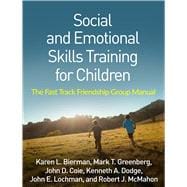From leading authorities, this volume presents a unique evidence-based group intervention for the 10–15% of children who are challenged by peer difficulties in elementary school. The book features 145 engaging full-color reproducible handouts, posters, and other tools. In addition to teaching core social skills (participation, communication, cooperation, good sportsmanship, conflict resolution), Friendship Group promotes emotional understanding and empathy, self-control, and effective coping with social stressors. Two complete sets of sessions are provided (grades K–2 and 3–5), including step-by-step implementation guidelines. The large-size format facilitates photocopying; purchasers also get access to a Web page where they can download and print the reproducible materials.
See also the authors' Fast Track Program for Children at Risk: Preventing Antisocial Behavior, which describes the landmark study that used Friendship Group in tandem with other school- and family-based interventions.
See also the authors' Fast Track Program for Children at Risk: Preventing Antisocial Behavior, which describes the landmark study that used Friendship Group in tandem with other school- and family-based interventions.








